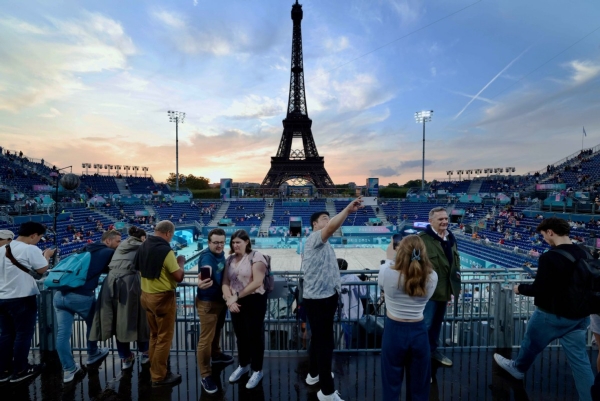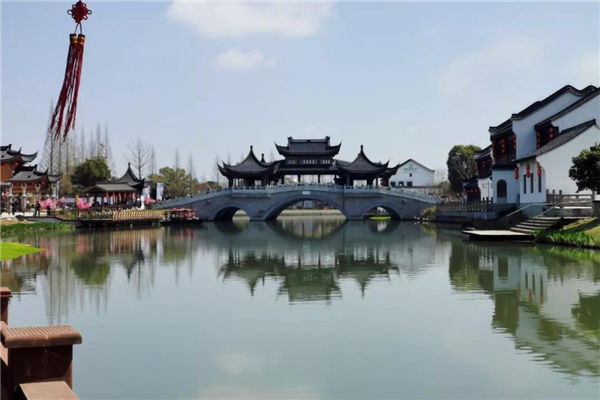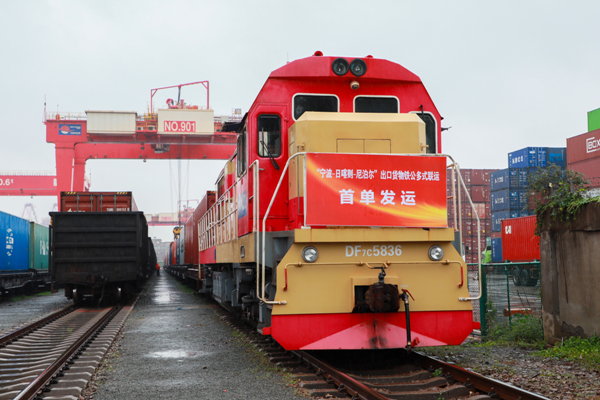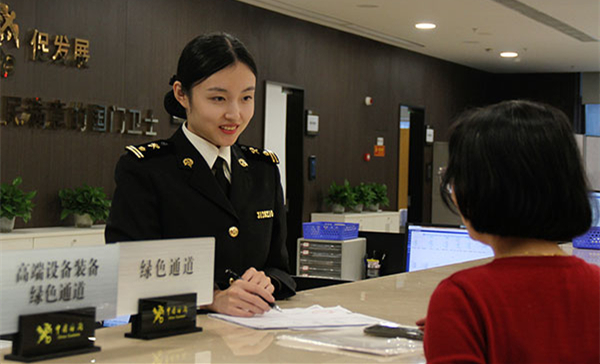Paris 2024 catapults Chinese tech to global fame

Audience take snapshots of Eiffel Tower after a beach volleyball match at a stadium nearby during Paris 2024. WEI XIAOHAO/CHINA DAILY
Paris 2024 will be remembered as much for sportspersons' medal-winning performances, memorable ceremonies, amazing venues and breathtaking logistics as for Chinese technology companies' contributions that, experts said, enhanced the quadrennial event like never before, impressing all stakeholders — participants, organizers, coaches, officials, spectators, TV and online audiences, media, advertisers and sponsors.
Chinese firms applied cloud computing and artificial intelligence innovatively in fields ranging from immersive live broadcast experiences to athletes' training, which improved the latter's performances, and can potentially transform future sporting events.
Experts further said the robust participation of Chinese companies in the prestigious sporting event demonstrates their growing technological prowess and independent innovation capabilities. This will help improve their international recognition and influence while boosting their global competitiveness.
More than two-thirds of live broadcast signals have been disseminated by Chinese tech heavyweight Alibaba Group's cloud broadcasting services during the Paris Games — a milestone in Olympic broadcast history.
The cloud computing platform has succeeded satellite broadcasting, which was launched during the 1964 Olympics in Tokyo for the first time, and has become the main method of remote distribution to broadcasters.
Alibaba Cloud, the cloud computing arm of Alibaba, which is a worldwide partner of the Paris Olympics, and Olympic Broadcasting Services have jointly launched OBS Cloud 3.0 to help media outlets get images and videos of the Games. OBS, a subsidiary of the International Olympic Committee or IOC, oversees the distribution of event coverage.
A record-breaking 11,000 hours of Olympics footage has been distributed to more than 200 countries and regions with the help of Alibaba Cloud's global cloud infrastructure, reaching billions of viewers worldwide.
The cloud-based technology is a game-changer for global media. Prior to this technological breakthrough, broadcasters had to rely on dedicated and more expensive international telecommunication optical circuits and spend a considerable amount of time to set up the equipment, in order to send live footage halfway across the globe back to their home countries.
In September 2018, Alibaba Cloud launched OBS Cloud in conjunction with OBS, and supported the broadcasts of the Tokyo 2020 Olympics and the Beijing 2022 Winter Olympics.
The company also provided AI-enabled multicamera replay systems at the Paris Games to elevate viewing experience. These systems have been deployed across 14 venues covering 21 sports and disciplines, such as badminton, track and field, basketball, beach volleyball and table tennis.
The systems provided frame-freeze slow-motion replays of athletes' performances, giving global viewers a more immersive experience by transforming live footage into precise 3D models, and allowing sports fans to access detailed information for deeper analysis of such performances.
Paris 2024 is the first Summer Olympics to see the extensive use of AI technology. The IOC has described AI as a game-changer, and launched the Olympic AI Agenda in April, setting out the envisioned impact that AI can deliver for sport.
Thomas Bach, the IOC president, highlighted the key areas where AI has been utilized at this year's Olympics. These include safeguarding against cyber abuse, creating video highlights in multiple formats and languages, and implementing a sophisticated data capture and energy management system to enhance sustainability.
Chinese tech giant Baidu Inc offered an AI-powered auxiliary training system, which is based on its ChatGPT-like product and large language model Ernie Bot, for China's national diving team, helping the latter achieve good results.
"The AI system allows timely playback and scoring," said Quan Hongchan, who triumphed in the women's 10-meter platform diving event, adding the diving auxiliary training system can be used to refine a diver's movements during daily training, providing her with additional coaching support.
The diving training system can understand complex instructions from coaches, record athletes' diving posture and actions, and score their real-time movements, in order to provide precise quantitative assessment and scientific guidance for training and competition, said Wang Haifeng, chief technology officer of Baidu.
Baidu explained that the AI system starts collecting and recording information from the moment the athletes step on the diving board and stops recording after they enter the water surface.
High-speed video can be fed back to the coaches' tablets in real time, and the system can analyze diving actions on the 3D space through 3D modeling technology, which supports 360-degree free rotation for viewing, making training more scientific and effective.
Wang Peng, a researcher at the Beijing Academy of Social Sciences, said, "The application of China's state-of-the-art digital tech at the Paris Games has improved the viewing experience for sports enthusiasts around the world, and showcased Chinese companies' leading position in tech frontiers and their strengths in technological innovation."
By participating in and providing technical support for the world's largest multisport event, Chinese tech companies have enhanced their brand awareness and influence in the international market, Wang said.
Their participation will let more overseas audiences learn about the country's rapid progress in cloud computing and AI technologies, as well as bolster the digital transformation and upgrading of international sports events, he said.
Data from market consultancy Mordor Intelligence showed that revenue from AI application in sports industry worldwide will grow from $5.93 billion in 2024 to $20.94 billion in 2029, with a compound annual growth rate of 28.69 percent.
The consultancy said AI is used to analyze data and engage fans, while real-time insights generated through data analysis during match time help teams make changes to their strategies.
Shen Yang, a professor from Tsinghua University's School of Journalism and Communication, said AI technology can play an auxiliary role in athletes' daily training, psychological assessment and event simulation by offering more precise and intelligent services, thus further improving athletes' performances.
During the Olympics, Chinese AI company SenseTime worked with the Chinese national basketball team to offer AI-driven sports data analysis and advice on strategies. It developed an AI-powered basketball performance analysis platform in collaboration with the Shanghai Artificial Intelligence Laboratory and Shanghai University of Sport.
The platform can analyze each athlete's state of motion and the trajectory of the basketball's movement in real time, and give immediate feedback to the coaching team by constructing 3D models and leveraging 3D motion capture algorithms, with a goal of improving athletes' training efficiency and their performance in competition.
Xu Li, chairman and CEO of SenseTime, said the combination of AI with sports is a potential direction for bolstering the application and development of LLMs in the future, adding the company can provide technological support in areas like athlete training, competition analysis and game broadcasting based on its vision large model system.
SenseTime's smart broadcasting technology has also been used to cover table tennis and archery events in Paris, creating an immersive viewing experience for audiences.
In cooperation with Shanghai Media Tech, a local media technology company, the company's InnoMotion broadcasting solution leverages 3D motion capture capacities to achieve multi-person, large-area and multi-angle coverage of various sporting scenes, without the need for wearable devices.
The technology can capture real-time spatial motion data and accurately track and analyze fast-moving, small targets such as table tennis balls and arrows. Audiences can clearly view the rotation direction and landing point of table tennis balls or the intricate flight trajectory of arrows via augmented reality technology on their screens, SenseTime said.
Apart from Chinese companies, US technology firms, including Intel and Google, brought their AI-related technology to the Olympics. For instance, Intel collaborated with the IOC to develop AthleteGPT, a chatbot that handled athlete inquiries and delivered customized information services during athletes' stay at the Olympic Village.
Google's AI technology featured in a recent partnership with NBCUniversal, a broadcaster of the Games, through things like 3D maps of venues and by pulling up information about specific sports.
The innovative use of cutting-edge technologies marks a step toward enhancing the overall Olympic experience for viewers. The Paris Olympics serves as a platform for different countries to display their latest achievements in world-leading technologies and innovations, said industry insiders.
Hong Yong, an associate research fellow at the e-commerce research institute of the Chinese Academy of International Trade and Economic Cooperation, said that Chinese companies' enthusiasm for Olympics also highlights their commitment and determination to expanding their presence in overseas markets and rising international competitiveness in the high-tech domain.
He further said the implementation of AI technology at Paris 2024 provided athletes with more scientific and personalized training methods, helping improve the level of competition and giving a strong boost to technological advancements of global sporting events.

 China makes outstanding contributions to global energy transition
China makes outstanding contributions to global energy transition  Ningbo village inspires Malawi official
Ningbo village inspires Malawi official  A look at China's economic data in the first three quarters of 2024
A look at China's economic data in the first three quarters of 2024 


